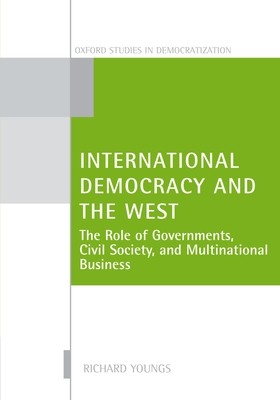
- We will send in 10–14 business days.
- Author: Richard Youngs
- Publisher: Oxford University Press, USA
- ISBN-10: 0199274460
- ISBN-13: 9780199274468
- Format: 16.4 x 24 x 1.8 cm, kieti viršeliai
- Language: English
- SAVE -10% with code: EXTRA
Reviews
Description
This book adds to debates over the international dimensions of democratic change by studying the policies and actions of three sets of Western actors: namely, governments, multinational companies, and international NGOs. This actor-based triangular approach responds to observations that the strategic, economic, and social aspects of international democracy have rarely been studied in a combined, holistic fashion. During the 1990s, Western governments, multinational companies, and civil society organizations all came to engage more notably in debates over democratic trends. But were they genuine when they professed a concern with democracy in developing countries? Which of these dynamics - governmental, commercial, or social - was the most influential in propelling efforts to encourage democratization and which helped explain the limits to democracy's international reach? Did political, economic, and social actors form a broad network of international democratic momentum, or did
their respective perspectives increasingly diverge? Exploring these questions, the book presents extensive empirical material relating to Western policies in a number of developing regions, covering the period from the mid-1990s to 2003.
EXTRA 10 % discount with code: EXTRA
The promotion ends in 21d.16:15:33
The discount code is valid when purchasing from 10 €. Discounts do not stack.
- Author: Richard Youngs
- Publisher: Oxford University Press, USA
- ISBN-10: 0199274460
- ISBN-13: 9780199274468
- Format: 16.4 x 24 x 1.8 cm, kieti viršeliai
- Language: English English
This book adds to debates over the international dimensions of democratic change by studying the policies and actions of three sets of Western actors: namely, governments, multinational companies, and international NGOs. This actor-based triangular approach responds to observations that the strategic, economic, and social aspects of international democracy have rarely been studied in a combined, holistic fashion. During the 1990s, Western governments, multinational companies, and civil society organizations all came to engage more notably in debates over democratic trends. But were they genuine when they professed a concern with democracy in developing countries? Which of these dynamics - governmental, commercial, or social - was the most influential in propelling efforts to encourage democratization and which helped explain the limits to democracy's international reach? Did political, economic, and social actors form a broad network of international democratic momentum, or did
their respective perspectives increasingly diverge? Exploring these questions, the book presents extensive empirical material relating to Western policies in a number of developing regions, covering the period from the mid-1990s to 2003.


Reviews